What the Chaos in the UK Means, a Primer for Americans
Important reminder: only one more day left to subscribe before you miss out on full access to my Shero newsletter and all of my posts! You can still get in on the amazing deal flagship supporters for the rest of the day, but starting September 25th things will go full price. Be sure to sign up now by clicking the button below so that you don’t miss a thing!
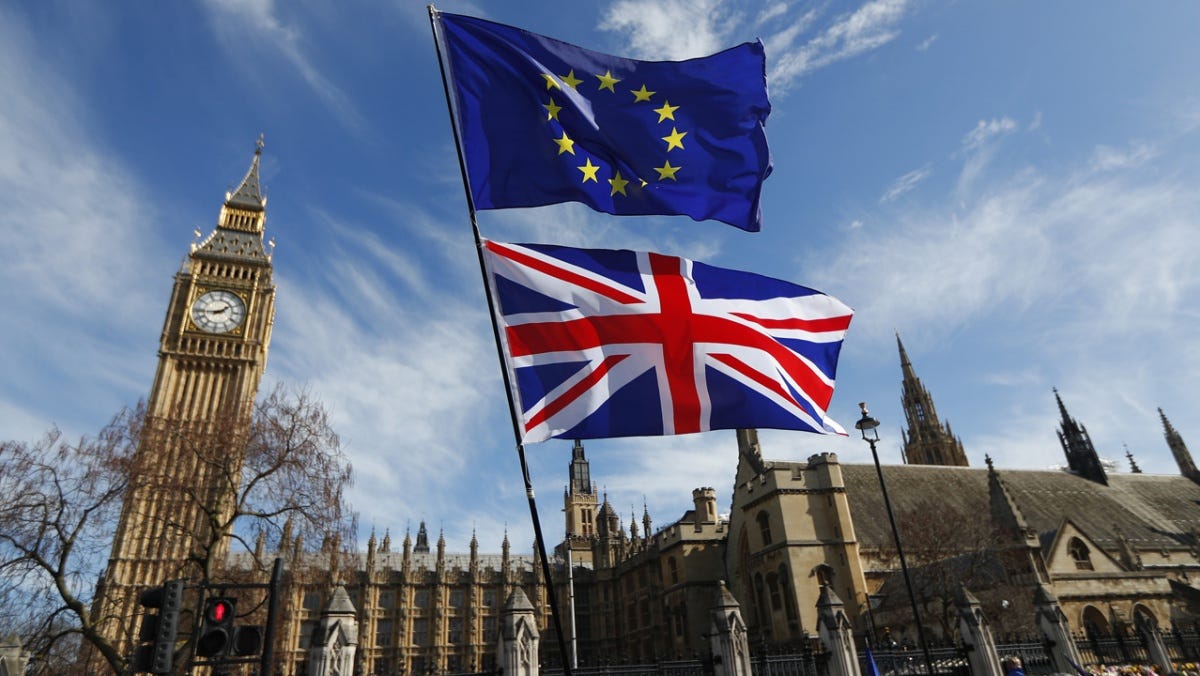
Prime Minister Boris Johnson faces an epic showdown in Parliament as the House of Commons attempts to take control of the agenda and stop a no-deal Brexit. In a no-deal scenario, the United Kingdom would immediately leave the European Union overnight, with no agreement about the "divorce" process, forgoing a 21-month transition period crafted by former Prime Minister Theresa May. The ramifications of this type of exit would be substantial and affect trade, law enforcement, governing bodies, taxes and the British contribution of £9 billon a year to the E.U. budget. As reports continue of unprecedented moves by leadership in Britain and new attempts by politicians to utilize every legal tool possible to stop Boris Johnson, let’s take a look at the events from an American perspective so that we can grasp how serious this is.
Background
On June 23, 2016, the U.K. held a referendum vote to decide whether the U.K. should leave the E.U. or remain. The E.U. is an economic and political union involving 28 European countries with heavily co-mingled economies and laws, that allows for free trade and free movement in Europe. The turnout was incredibly high at 72%, with 30 million people voting, and those in favor of leaving won by a fairly narrow margin of 52% to 48%.

The measure was pushed by the The U.K. Independence Party (UKIP) and led by Nigel Farage, who emphasized Europe’s ongoing migrant crisis and the terrorist attacks in Paris and Brussels as evidence for Britain’s need to leave the European Union. Farage and UKIP focused on defying political correctness (think Tea Party), while espousing nationalist politics such as immigration (think Trump) that sought to pull in dissatisfied Conservatives who were unhappy with the performance of Prime Minister David Cameron, while attempting to attract liberal protest voters. Sound familiar?
Following the Brexit vote, many people expressed regret about their vote to leave the E.U. The marketing campaign for Brexit was so successful that many people supported it without truly understanding the ramifications, which caused many to push for a re-vote due to the remorse of so many voters. Immediately following the vote, Google reported sharp upticks in searches about what Brexit actually meant and other questions concerning the implications of the vote.
Fallout
Brexit was supposed to happen on March 29, 2019. On March 29, 2017, then Prime Minister Theresa May invoked the formal process to leave the E.U. and kicked off negotiations on how the United Kingdom would extricate itself. But the Brexit date was delayed twice after that point. The E.U. and U.K. even agreed to a deal for leaving in November of 2018 that included the terms for Brexit and contained a non-binding political declaration on expectations for the future relationship of all parties, but Members of Parliament (M.P.’s) rejected the proposal three times.
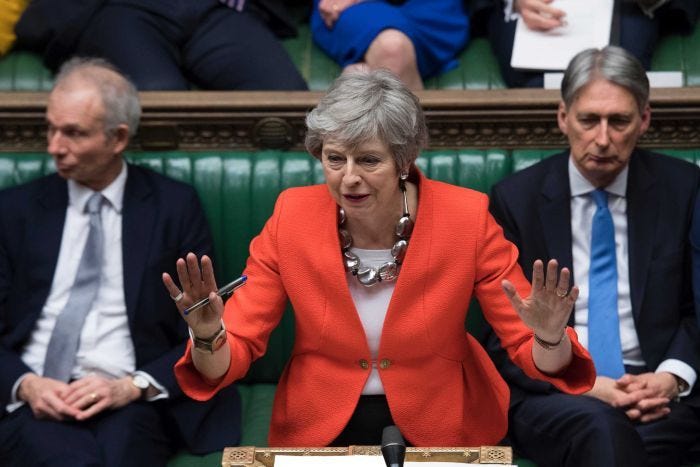
The issue for Conservatives members of the Democratic Unionist Party and DUP M.P.’s was the item called the “backstop,” which is a concept that there should be no new physical checks or infrastructures at the borders of Ireland. Goods and services are currently traded between the two jurisdictions freely with few restrictions. The U.K. and Ireland are part of the E.U.'s single market and customs union, so products do not need to be inspected for customs or standards. Brexit could change all of that because two parts of Ireland could end up being in different customs and regulatory regimes. Brexit could result in products being checked at the border, which both political sides in the U.K. oppose.
Both sides have proposals on how to keep the Irish border open, but if neither can be agreed upon, the backstop measure goes into place. If this happens, Northern Ireland will stay aligned with some rules of the E.U. single market, which means goods coming into Northern Ireland from elsewhere in the U.K. would need to be checked. The backstop would also create a temporary single customs territory, effectively keeping the UK in the EU customs union, even after the intention to extricate itself entirely.
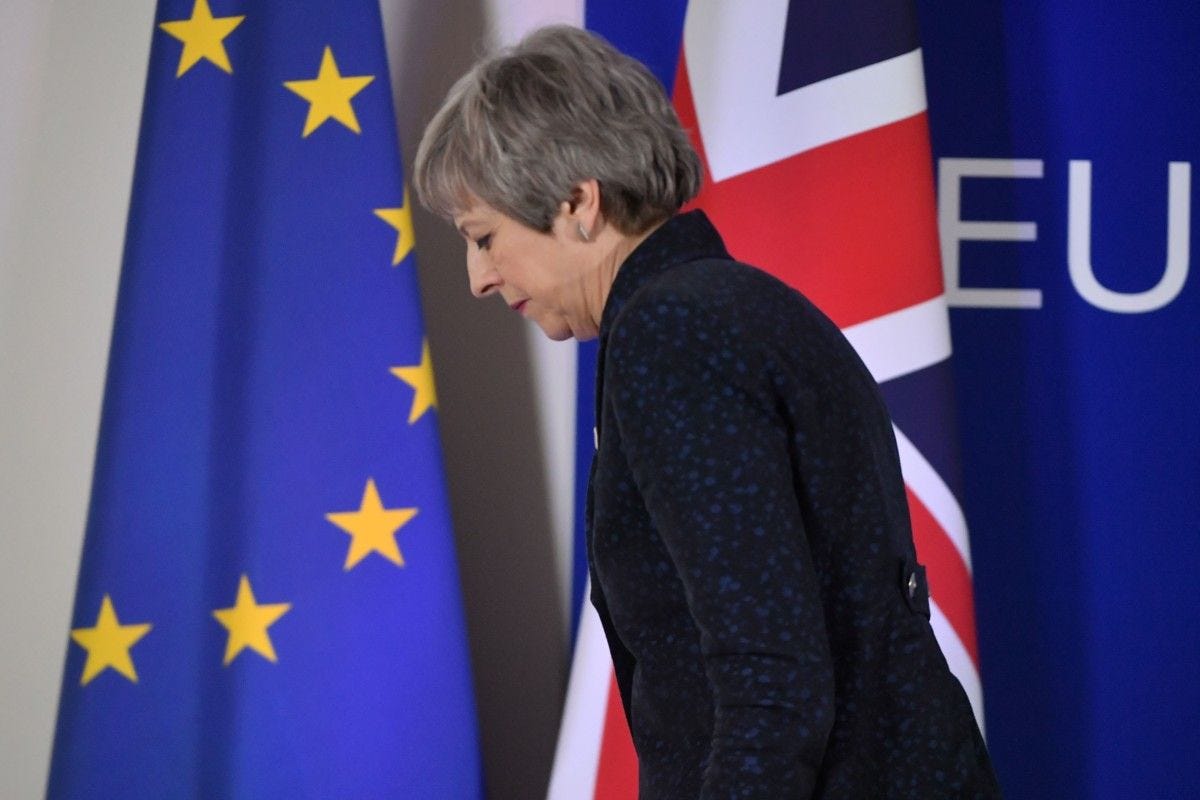
Cut to Theresa May trying to negotiate the nearly impossible and failing to get parliamentary support for the legislation needed to implement the deal she had agreed to. May crafted a deal that was ultimately rejected three times by Parliament, as she attempted to compromise with one side only to anger the other. On May 24, 2019, Theresa May officially announced her resignation as Conservative leader, saying: "It will always remain a matter of deep regret for me that I have not been able to deliver Brexit." Enter Boris Johnson.
Next Level Chaos
On July 24, 2019, Boris Johnson became Britain’s new prime minister and he vowed to lead the U.K. out of the European Union, “no ifs, ands or buts.” With a looming deadline of October 31st, Johnson will have only 99 days to make good on this promise and deliver Brexit at any cost. Johnson has vowed that Britain will leave the E.U. on Oct. 31, regardless of the terms for departure. This brash mentality by Johnson threatens complete upheaval as economists warn that a “no-deal” type of Brexit would substantially disrupt trade and likely plunge the U.K. into recession. The E.U. is also holding strong, arguing that the deal it made with May will not be renegotiated.
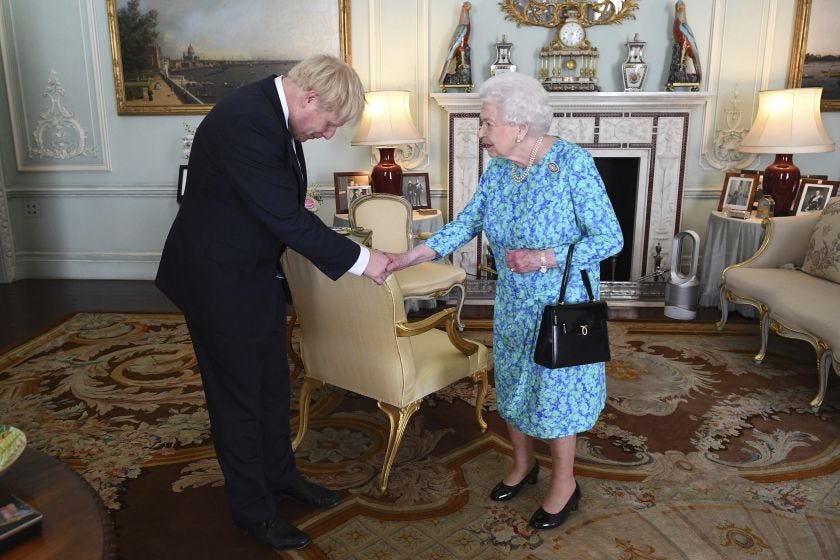
In addition to the looming threats over the economy and the pending opposition by the E.U., there is the issue of trade. The terms for continued trade would initially have to be set by the World Trade Organization (WTO) and if this happens, tariffs (taxes on imports) will apply to most goods sent buy U.K. businesses to the E.U., which will hinder business. If the U.K. leaves the customs union and single market, then the E.U. will start carrying out checks on British goods. This could lead to delays at ports, creating traffic bottlenecks and disrupting supply routes and further damaging the economy. A no-deal strategy would also mean that the U.K. service industry would lose its guaranteed access to the E.U. single market and this would affect everything including banking, insurance, lawyers, musicians and chefs.
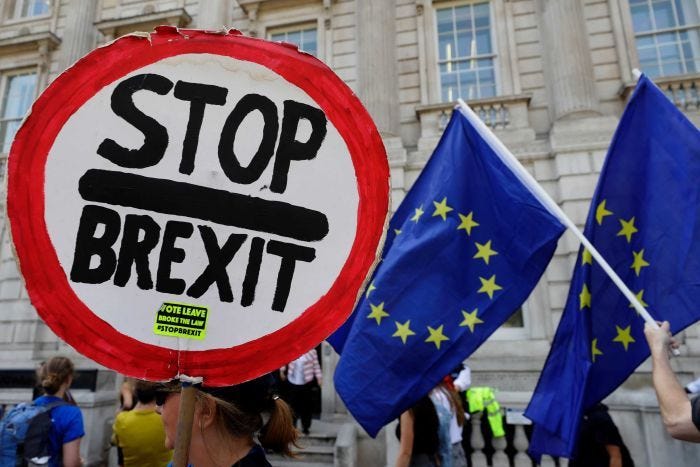
Boris Johnson seems to have very little concern for any of these ramifications as he focuses on pushing a though a disastrous exit at any cost. Even though Johnson has tried to calm fears by announcing an extra £2.1 billion of funding to prepare for a possible no-deal outcome by the October 31st deadline, tensions only continue to escalate as his leadership is questioned and protestors continue to take to the streets in protest.
Unprecedented Moves and Counter-Moves
In a move to make it a lot harder for Parliament to oppose leaving the European Union without a deal in place, Johnson asked Queen Elizabeth II to prorogue, or suspend Parliament last week. She expectedly obliged. It’s now expected that Britain’s central political body will be suspended for five weeks (September 9 at the earliest, September 12 at the latest) until October 14th. This means that Members of Parliament will only have a very narrow window to debate, scrutinize, and pass a Brexit deal or stop the UK from exiting the European Union without an agreement in place on October 31st. Considering the fact that no one has been able to find a solution for over two years makes this window of a week completely impossible.

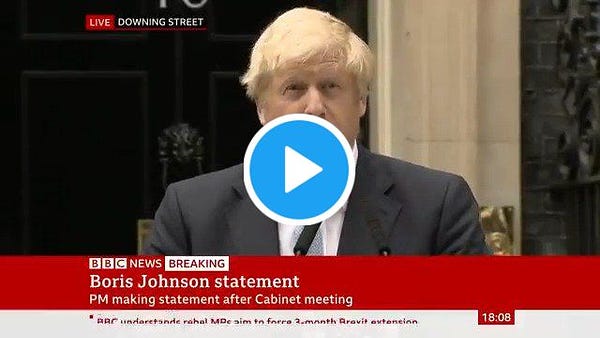
Even more concerning is Johnson’s unwillingness to admit that he has suspended Parliament to force a no-deal Brexit situation as he formally denies that the shut-down has anything to do with the national crisis over Brexit. In a letter to lawmakers, the prime minister said this legislative session had to end, as it’s one of the longest in history. No one on either side is really buying this — MP’s and former leaders claim this is just a “dressed up” excuse to push Brexit through at any expense, forcing the U.K. into a Constitutional crisis.
Showdown
Parliament has returned from its summer break today (Tuesday, Sept. 3rd) and all sides are prepared to defend their sides at all costs. Boris Johnson has restated his vow to take Britain out of the European Union by October 31, "do or die," and shows no signs of deviating from that plan. This hard-line approach has now alarmed moderate figures in Parliament, including some lawmakers from his own Conservative party, who think the no-deal plan is an impending disaster that would destroy the British economy as well as the UK's reputation among its allies. Opposition to the no-deal exit strategy continues to grow as many are determined to prevent Johnson from leading Britain out of the EU without a deal with the same vigor employed by the Prime Minister.
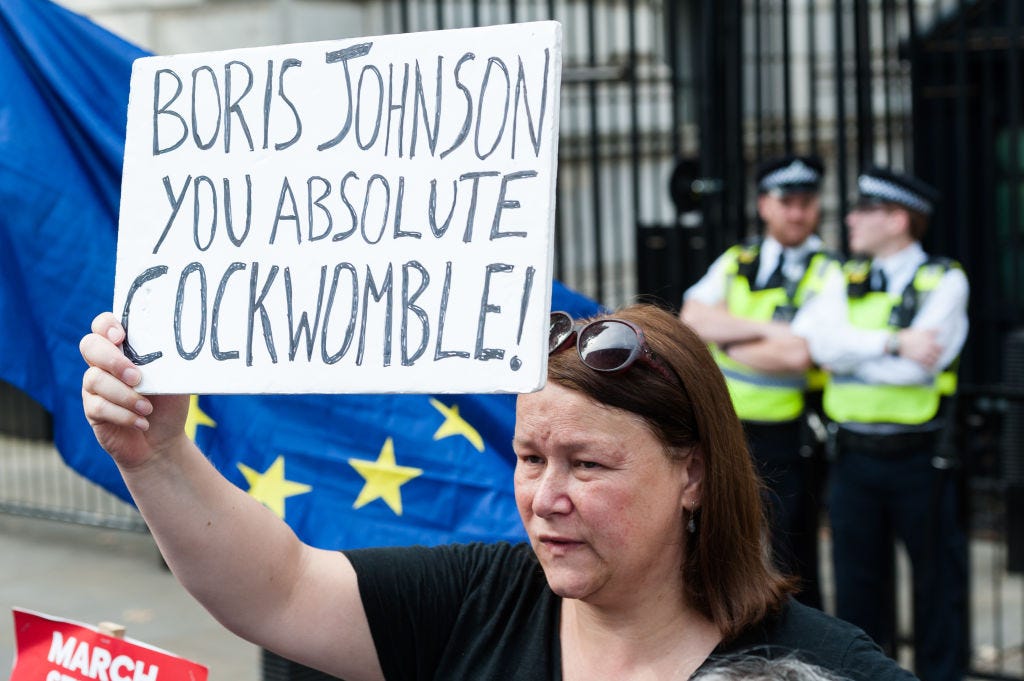
The clock has started to tick as opposition lawmakers will have just a handful of days to pass legislation preventing a no-deal before next week, when Parliament shuts up shop until October 14 due to the recently enacted prorogue. Once Parliament returns from the shut-down, politicians will only have 17 days before Britain is due to leave the European Union. All of these impending deadlines set the stage for an epic battle between Johnson's critics and supporters in Parliament as each MP is scrambling to utilize every political tool at their disposal.
Here’s what will need to happen to check the actions of Prime Minister Johnson:
opposition lawmakers will need to take control of the day's agenda and call for an emergency debate — this is called Standing Order 24 or SO24.
House of Commons Speaker John Bercow (a larger-than-life character in British politics) must decide on whether to grant an emergency debate. Given his support thus far for the dissident voices in Parliament, he will likely allow the debate.
Opposition will need to quickly push through a bill blocking a no-deal plan on October 31st. The text of that bill was published Monday night and is backed by a group of opposition and rebel Conservative lawmakers within Johnson’s own party.
If this bill succeeds and is put into law, Johnson would then be forced to re-negotiate a new deal with the E.U. at a summit scheduled for mid-October. If he fails to do this, Johnson must then seek an extension to the Brexit process until January 2020 or to seek Parliament's consent for for a no-deal Brexit, which is highly unlikely given the majority of MPs opposed a no-deal Brexit in previous votes.
If opposition succeeds in getting as bill passed to stop a no-deal in the House of Commons, it will then head to the House of Lords, which is notorious for wasting time. Parliament doesn't meet on Fridays, so Thursday is the last sitting this week, but there is a possibility of an emergency sitting into the weekend.
Constitutional scholars argue that even if the bill does pass, the government can still technically ignore it and if the law is challenged the entire issue will head to the courts regardless.
Legal action is already currently underway on Johnson’s actions in three courts across the U.K. as we speak in an effort to stop the P.M. from suspending Parliament at all. One of the cases, set to take place in Edinburgh, could lead to an explosive hearing as lawyers for the M.P.’s have demanded a sworn statement from Boris Johnson himself about why he is proroguing Parliament. Revelations from this court case are coming out now, as court documents have just revealed that Boris Johnson secretly agreed to suspend parliament in mid-August — Johnson previously denied any such intention publicly.
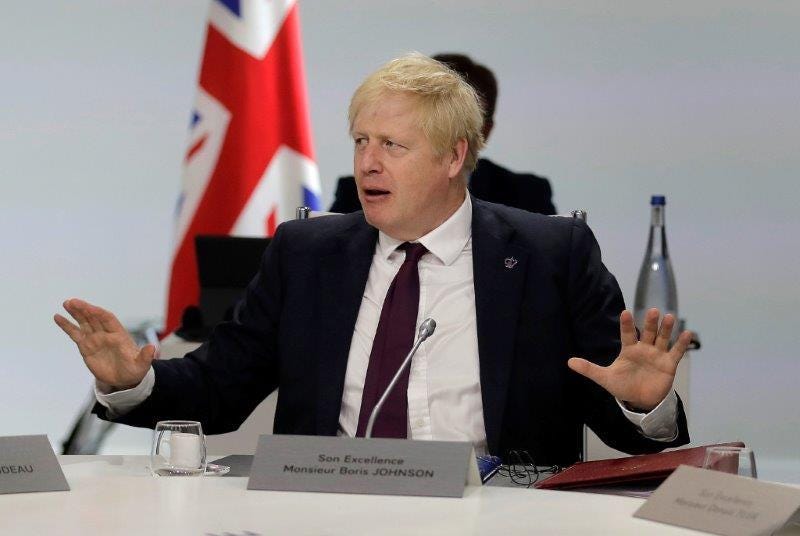
In response to the no-deal threats now posted by all sides in Parliament across political and legal avenues, Boris Johnson announced on Monday evening (Sept. 2nd) that he would pursue a general election if lawmakers succeed in blocking a no-deal Brexit in Parliament this week. This means that those on Johnson's side who oppose him in support of this bill on Tuesday would be at risk of being thrown out of the parliamentary party and barred from standing as a Conservative at any future election if they stand in the way of a no-deal exit. It’s clear Johnson sees a general election as a chance to increase his majority and strengthen his position, but Theresa May tried the same thing in 2017 and it was an epic failure.
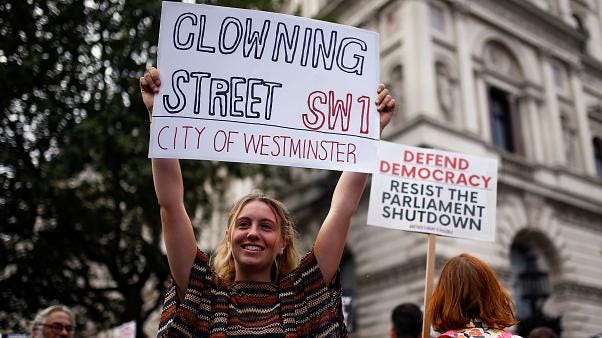
Although opposition parties have pledged to support a general election, so long as it happens before October 31st, Johnson has the power to promise that timeframe and then change it at the last minute to throw off the vote. Johnson is also playing on Labour’s confidence, the party that has suffered lately in opinion polls. The opposition can also counter with calling for a no-confidence vote in the government, which could either result in a new government, or a general election. There are many players and tactics in play, but what is clear is those who oppose the Prime Minister’s tactics to achieve a no-deal version of Brexit are running out of time.

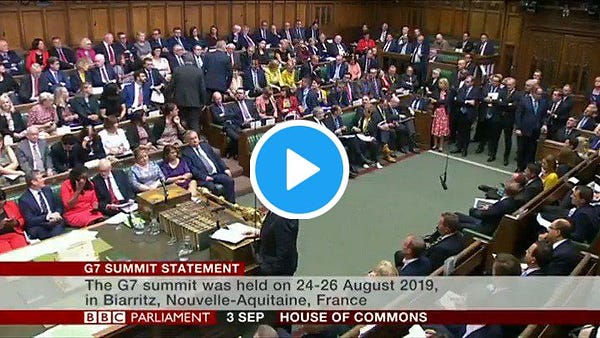
The next two weeks will be action packed as the battle will continue in the courts and in Parliament to protect the U.K. from careening to a disastrous exit from the European Union. The U.K. sets the trends for America, particularly in politics and the economy, so we should all pay close attention. The economic fallout from Boris Johnson’s bluster and hubris, will likely spark an immediate recession and will undoubtedly trigger the same effect here in America. Given our already shaky situation here with Trump and an economic inversion curve that has matched the U.K.’s in the last few weeks, this could spell disaster for all of us.
Update: Dr. Phillip Lee, MP has just formally resigned his membership in the Conservative party to join the Liberal Democrats, thereby stripping Boris Johnson of his very narrow majority.

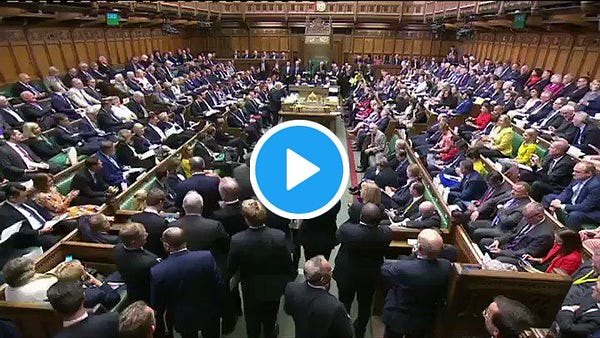
Lee further explains his decision to defect below expressing that his other colleagues are also “searching their souls” over the brash moves made by Johnson.

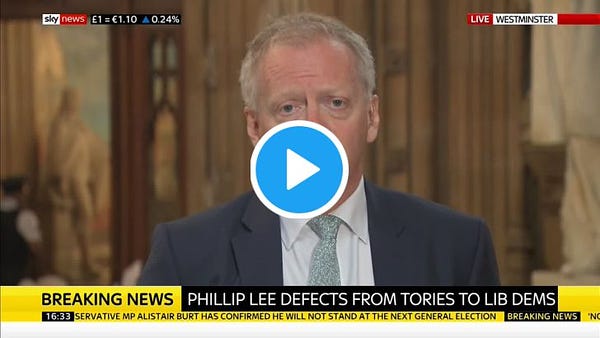
Second Update: At roughly 6 p.m. ET, Tory rebels and opposition M.P.’s have defeated the government, checking off the first stage of their plans to pass a bill that will prevent a no-deal Brexit. The House of Commons just voted 328 to 301 to take control of the agenda, which means they can now bring a bill forward that extends the deadline for an exit date in the U.K. Opposition will now have a chance to introduce a cross-party bill which would force the prime minister to ask for Brexit to be delayed until January 31st, unless M.P.’s approve a new deal. They could also vote in favor of a no-deal exit by October 19th, but this is highly unlikely given the strength of opposition.
The result of this takeover means that Members of Parliament will be able to take over Commons business tomorrow to present a bill. It’s important to note that 21 Tory M.P.s, including a number of ex-cabinet ministers, joined opposition parties to defeat the government in this latest move to stop the prime minister. Boris Johnson has said he will bring forward a motion for an early general election as a result and Labour leader Jeremy Corbyn has said that the bill to stop the no-deal should be passed before any election is held.
Be sure to follow my Twitter feed where I will provide updates as they come in.
If you like this piece and you want to help promote independent journalism from a female perspective, please support my work by clicking the button below to sign up for a free subscription.
Amee Vanderpool writes the “Shero” Newsletter and is an attorney, contributor to Playboy Magazine, analyst for BBC radio and Director of The Inanna Project. She can be reached at avanderpool@gmail.com or follow her on Twitter @girlsreallyrule.




